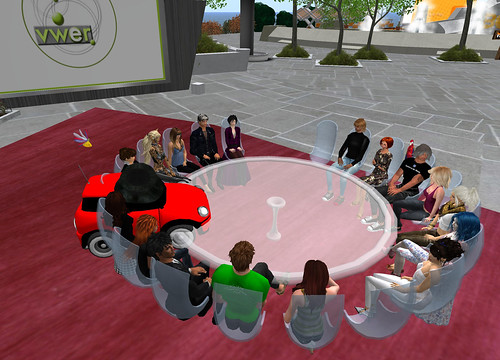Location: Nevermore Island, Jokaydia Grid
Immersion in a roleplaying setting means that, while exploring a doomed family's mansion and grounds in the year 1847, one should not glimpse Tesla Coils and trees the side of skyscrapers. When I did, I realized that raising some mountains would be in order.
My neighbors in Jokaydia Grid have some well conceived builds. I just don't want my students to see them, as they take on the role of Poe's narrator in "The Fall of the House of Usher." Unlike what I did in Second Life, here I'm not interested in having them experience a world: I want them to experience a closed simulation. So I began to raise the borders of the sim; gradually the Mountains of Nevermore got very steep.
When my geomancy was finished, the result amazed me. The borders of the sim now seem very far away. This too will become part of our roleplay.
Parts of the island are now very hard to navigate, and the difficulty increases as an avatar walks toward the mountains that ring all of the island except near rocks where the shipwreck of Grampus rests. That hulk contains some important clues about the dark history of the Usher family.
I've been playing with the idea of having several ghosts near the ship and on the land, instead of simply in the house; most of these spirits will help the students by giving them hints and clues. I may have one or two who are malicious. I've also hidden clues in the swamps and woods near the mountains.
When we run the simulation, I will turn flying off on the island. In the end, I hope we have a place where avatars who leave the House will get lost in a space that seems larger than it really is.
When I ran the Poe build in Second Life, in theory anyone could come by the site. My fears were that some exotic-dancer avatar, in pasties and g-string, would burst in using IM-doofus text chat during a crucial moment of the roleplay. I suppose we'd have pretended she was the ghost of some mad Victorian harlot.
Second Life users are mesmerized by the coming of more advanced mesh items to that grid. I am curious on several levels, but in particular I wonder if the added complexity won't slow to a crawl any systems save for high-end desktop computers. That would be a terrible outcome for educators who remain there. In leaving SL for my work, I've given up many things--namely, the loss of great inventory available at very low prices. But going back, at Linden Lab's rates for tier, is simply not an option.
And, gradually, as the Jokaydia Grid sim comes to life, with content mentioned in my prior post, I think we'll have ourselves a wickedly immersive time in our new home, even without the bells and whistles SL can provide to those with very fast computers.




